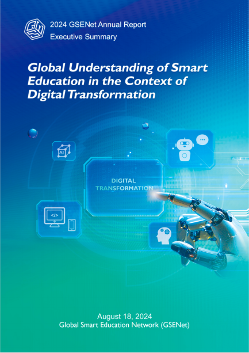On August 18, Beijing time, at the 2024 Global Smart Education Conference, Professor Huang Ronghuai, Co-Dean of the Smart Learning Institute of Beijing Normal University (SLIBNU), and Professor Zhan Tao, Director of the UNESCO Institute for Information Technologies in Education (IITE), jointly unveiled the research report titled Global Understanding of Smart Education in the Context of Digital Transformation on behalf of the Global Smart Education Network (GSENet).
As the latest key outcome of GSENet’s "Joint Research Program on National Smart Education Strategies," the report aims to enhance international understanding of Smart Education and drive the global digital transformation of education. It holds significant importance in marking the inaugural year of Smart Education.
Unique Features of the Report
1. Provided a comprehensive analysis of perspectives from educators, policymakers, and scholars across the globe on the concept and characteristics of Smart Education, Highlighting the common understanding, main features and regional adoption of Smart Education from a global perspective.
2. Conducted a comprehensive textual analysis of digital education policies across 48 countries and organizations, grounded in the 6 key concerns of the Smart Education Framework. The analysis revealed that policy planning of Smart Education encompasses three distinct stages: digitization, demonstrating the deep integration of digital technology; cyberization, showcasing the full utilization of data elements; and intelligentization, reflecting the effective adoption of intelligent technologies.
3. Established a global observation framework for the development of Smart Education, consisting of 10 primary indicators and 30 sub-indicators, and developed a global Smart Education dataset with 58 observation points, aimed at analyzing the contribution of key Smart Education characteristics to improving the quality of education.
4. Invited global experts to participate in a series of webinars focused on the inclusivity and equity of Smart Education, and continues to conduct relevant case studies to further explore these areas.
Key Highlights of the Report
1. The concept of smart education is gradually being demystified across several countries and regions within the context of diverse cultures, technological adoption, and pedagogical practices.
2. Performative features (learning, assessment, infrastructure, sustainability, equity) and constructive features (students, teachers, digital technology, policy, partnership) of smart education depict the ideal blueprint for quality education.
3. Digital education policies to attain smart education should emphasize the need for robust infrastructure, prioritize capacity building, and create a high-quality, inclusive, sustainable digital education ecosystem.
4. Across different countries and regions, access to digital technology beyond schools, E-leadership training in schools, adaptive learning resources and forward-responsible thinking should be fully emphasized to achieve the Education Agenda 2030.
Attachment:https://cit.bnu.edu.cn/docs/2024-09/fa33299274b54209b1fc5344b4bfdfdf.pdf



